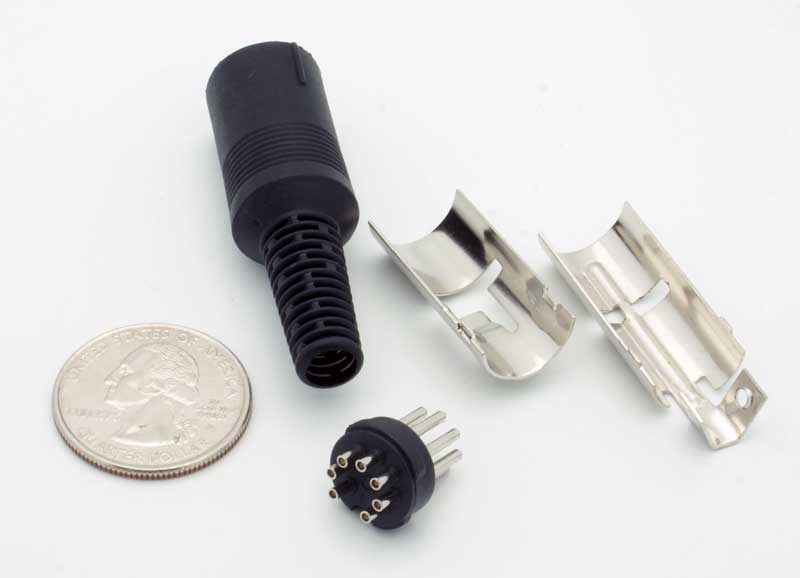Printable Version of Topic
Click here to view this topic in its original format
914World.com _ 914World Garage _ help soldering din connector
Posted by: bradtho Mar 16 2016, 09:46 PM
I'd like to make an input for my blaupunkt deck. I found these connectors but am not really clear on how to solder them. From this pick, it looks like the cup side is already filled with solder or is super shallow. Anyone have experience with these?
To make matters worse. The plugs that I have (purchased from vetco, same as this pic) actually don't appear to have the shallow cups. In the store (without my glasses) it looked like they were just pins with no accommodation for soldering. Are they likely just filled to the brim w/ solder?
YouTube is usually the DIY best friend, but surprisingly it doesn't seem to have anything about soldering these up. Anyone here more experienced with these?
thanks
Posted by: era vulgaris Mar 17 2016, 10:53 AM
I design and build custom audio equipment for recording studios and audio engineers, so a large portion of my time is spent soldering circuit boards and audio connectors. I have never seen a connector that comes pre-filled with solder. I'm pretty sure such a thing doesn't exist. As a tech I could tell you that something like that would irritate me if it did. Who knows the quality or composition of the solder that's in it. I only use SN62, and i dont want some 60/40 in anything i build. What if your product had to meet ROHS standards, and the solder in there was lead bearing? I'd never buy a product like that if it did exist , but I really don't think it does.
Easiest way to solder this is to use a table clamp to firmly hold the connector in place. Fill the cups with solder. Strip and tin the wires to be soldered. Then heat the cups until the solder melts and insert the tinned wire. EZ-PZ.
For the ones that don't have cups, tin the wire and hold the wire against the pin with your soldering iron. The solder from the tinned wire will hold it to the pin. A table clamp is mandatory for this.
Also using a pencil iron (min 30 watts, preferably 40 watts) and thin solder not thicker then 0.7mm makes the job easier.
And don't forget to put the rubber boot on the wire before you solder it to the connector!!!
Posted by: jd74914 Mar 17 2016, 12:34 PM
![]() I assembly D-sub connectors for instrumentation cabling the same way.
I assembly D-sub connectors for instrumentation cabling the same way.
I've never seen a prefilled solder cup connector either.
Could you take a picture of the cups you purchased?
Posted by: Bartlett 914 Mar 17 2016, 01:55 PM
And don't forget to put the rubber boot on the wire before you solder it to the connector!!!
Ah. The dreaded banana plug effect LOL
Posted by: bradtho Mar 17 2016, 09:42 PM
Thanks, this is exactly what I was looking for. Nothing ever suggested the cups were pre-filled, I was just trying to find some way to make sense of it.
I didn't realize you could solder the tip of the wire to the pin. Just seems to me like it would easily disconnect. But now that I know to try searching for "pin" found some good YouTube's, like this https://www.youtube.com/watch?v=IkjMK26ROcM
No pics of the specific connector I've been talking about because I didn't buy it yet because I didn't understand how to use it!
Thanks guys. I love this site!
Posted by: Mike Bellis Mar 17 2016, 10:13 PM
Or you could just buy a Blau DIN plug with RCA jacks. Cheap and easy...
Posted by: bradtho Mar 17 2016, 10:33 PM
Or you could just buy a Blau DIN plug with RCA jacks. Cheap and easy...
that sounds great, but a quick search found them ranging from $15 for mono to $60!
None have an inline switch which I believe is needed to handle the input switching cleanly. plus I'm a CSOB!
Posted by: jtprettyman Mar 18 2016, 09:44 AM
[quote name='era vulgaris' date='Mar 17 2016, 11:53 AM' post='2316966']
Easiest way to solder this is to use a table clamp to firmly hold the connector in place. Fill the cups with solder. Strip and tin the wires to be soldered. Then heat the cups until the solder melts and insert the tinned wire. EZ-PZ.
Nailed it. I used to use these extensively for instrumentation / measurement equipment in the auto industry. Very easy to use.
Powered by Invision Power Board (http://www.invisionboard.com)
© Invision Power Services (http://www.invisionpower.com)
